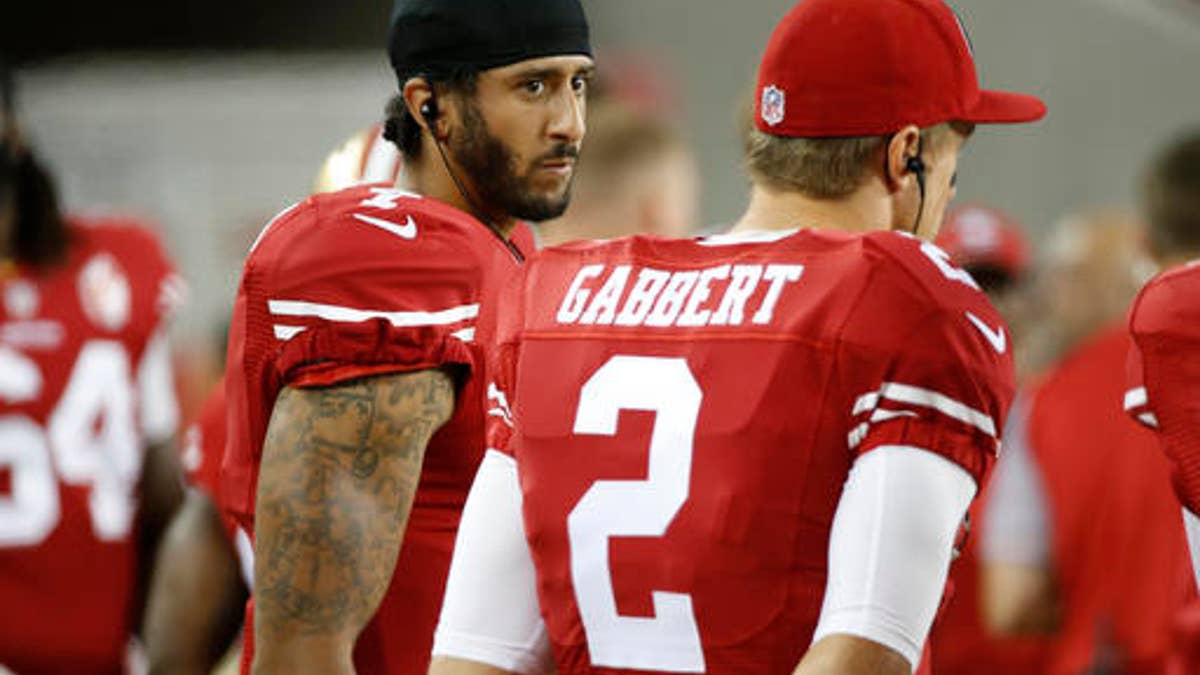
San Francisco 49ers quarterbacks Colin Kaepernick, left, and Blaine Gabbert stand on the sideline during the second half of an NFL preseason football game against the Green Bay Packers on Friday, Aug. 26, 2016, in Santa Clara, Calif. Green Bay won 21-10. (AP Photo/Tony Avelar)
San Francisco 49ers quarterback Colin Kaepernick ignited a social media firestorm Saturday after he refused to stand during the playing of the National Anthem before Friday night’s pre-season game against the Green Bay Packers.
In a post-game press conference, Kaepernick explained his reasoning for the overt act of disrespect toward both the American flag and the United States.
“I am not going to stand up to show pride in a flag for a country that oppresses black people and people of color," Kaepernick said after the game. "To me, this is bigger than football and it would be selfish on my part to look the other way. There are bodies in the street and people getting paid leave and getting away with murder.”
Kaepernick appeared to be echoing both a broader condemnation of race relations in the United States as well as a veiled commentary on his apparent belief that the American law enforcement community is engaging in systemic, racially motivated murder.
Kaepernick’s comments weren’t just an insult to the over one million Americans -- many thousands of whom were African-American -- who have given their lives in defense of the United States from wars as far back as the American Revolution to the more recent conflicts in the Middle East.
Kaepernick also turned his back on the thousands of police officers -- again, a tremendous number of whom were African-American - who have died defending their communities and upholding the rule of law at home.
Just this year alone, the number of police officers shot and killed on duty has climbed to 37, a whopping 61 percent higher than at the same point in 2015.
The San Francisco 49ers released a statement concerning Kaepernick’s protest, reading in part, “The national anthem is and always will be a special part of the pre-game ceremony. It is an opportunity to honor our country and reflect on the great liberties we are afforded as its citizens.”
The 49ers added, “In respecting such American principles as freedom of religion and freedom of expression, we recognize the right of an individual to choose and participate, or not, in our celebration of the national anthem.”
No one should question whether or not Kaepernick had a right to sit, stand, or protest the National Anthem, no matter his motivation. We are blessed to live in a country where an act perceived by most as an ugly display of disrespect is protected by the very system of government prompting the protest.
But to what end? Was Kaepernick merely using his status as a public figure to advance a rudimentary talking point about race relations and law enforcement in America? Or was he genuinely interested in trying to be part of a more substantive conversation on a variety of deep social issues?
Many celebrities -- and yes, even a back-up quarterback on one of the worst teams in the NFL qualifies as a celebrity nowadays -- use their status within pop culture to advance their beliefs and opinions, often without acknowledging differing perspectives.
This is nothing new.
But if Colin Kaepernick were truly interested in being a part of the solution -- a meaningful interlocutor offering not just hyperbole but considered rhetoric -- he may have thought to open this dialogue with a sense of mutual understanding and respect and not by boldly thumbing his nose at both the American flag as well as the men and women of all races who have given their lives defending an American ideal -- imperfect in practice, yet exceptional nonetheless -- and one far greater than themselves.
